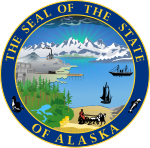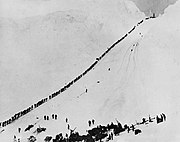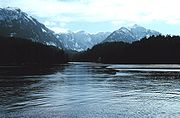Portal:Alaska
    Alaska (/əˈlæskə/ ə-LASS-kə) is a non-contiguous U.S. state on the northwest extremity of North America. It is in the Western United States region. The only other non-contiguous U.S. state is Hawaii. Alaska is also considered to be the northernmost, westernmost, and easternmost (the Aleutian Islands cross the 180th meridian into the eastern hemisphere) state in the United States. It borders the Canadian territory of Yukon and the province of British Columbia to the east. It shares a western maritime border, in the Bering Strait, with Russia's Chukotka Autonomous Okrug. The Chukchi and Beaufort Seas of the Arctic Ocean lie to the north, and the Pacific Ocean lies to the south. Technically a semi-exclave of the U.S., it is the largest exclave in the world. Alaska is the largest U.S. state by area, comprising more total area than the next three largest states of Texas, California, and Montana combined, and is the sixth-largest subnational division in the world. It is the third-least populous and most sparsely populated U.S. state, but is, with a population of 736,081 as of 2020, the continent's most populous territory located mostly north of the 60th parallel, with more than quadruple the combined populations of Northern Canada and Greenland. The state contains the four largest cities in the United States by area, including the state capital of Juneau. The state's most populous city is Anchorage, and approximately half of Alaska's residents live within its metropolitan area. Indigenous people have lived in Alaska for thousands of years, and it is widely believed that the region served as the entry point for the initial settlement of North America by way of the Bering land bridge. The Russian Empire was the first to actively colonize the area beginning in the 18th century, eventually establishing Russian America, which spanned most of the current state, and promoted and maintained a native Alaskan Creole population. The expense and logistical difficulty of maintaining this distant possession prompted its sale to the U.S. in 1867 for US$7.2 million (equivalent to $157 million in 2023). The area went through several administrative changes before becoming organized as a territory on May 11, 1912. It was admitted as the 49th state of the U.S. on January 3, 1959. Abundant natural resources have enabled Alaska—with one of the smallest state economies—to have one of the highest per capita incomes, with commercial fishing, and the extraction of natural gas and oil, dominating Alaska's economy. U.S. Armed Forces bases and tourism also contribute to the economy; more than half of the state is federally-owned land containing national forests, national parks, and wildlife refuges. It is among the most irreligious states, one of the first to legalize recreational marijuana, and is known for its libertarian-leaning political culture, generally supporting the Republican Party in national elections. The Indigenous population of Alaska is proportionally the second highest of any U.S. state, at over 15 percent, after only Hawaii. (Full article...) Entries here consist of Good and Featured articles, which meet a core set of high editorial standards.
 Curtis Jack Glencross (born December 28, 1982) is a Canadian former professional ice hockey player who played in the National Hockey League (NHL). An undrafted player, he signed with the Mighty Ducks of Anaheim as a free agent in 2004 and made his NHL debut with the team in 2007. He has also played in the NHL for the Columbus Blue Jackets, Edmonton Oilers, Calgary Flames and Washington Capitals. Glencross was an effective goalscorer and active within the community during his time in Calgary, which led to the team naming him its recipient of the Ralph T. Scurfield Humanitarian Award in 2012. After splitting the 2014–15 season between Calgary and Washington, Glencross was unable to reach a contract deal with any NHL team and opted to retire as a player. During his playing career, Glencross was a spokesman for the Special Olympics. He has also participated with Rae Croteau Jr.'s chuckwagon racing team in the summer. (Full article...)Eskimo (/ˈɛskɪmoʊ/) is an exonym that refers to two closely related Indigenous peoples: Inuit (including the Alaska Native Iñupiat, the Canadian Inuit, and the Greenlandic Inuit) and the Yupik (or Yuit) of eastern Siberia and Alaska. A related third group, the Aleut, who inhabit the Aleutian Islands, are generally excluded from the definition of Eskimo. The three groups share a relatively recent common ancestor, and speak related languages belonging to the family of Eskaleut languages. These circumpolar peoples have traditionally inhabited the Arctic and subarctic regions from eastern Siberia (Russia) to Alaska (United States), Northern Canada, Nunavik, Nunatsiavut, and Greenland. Some Inuit, Yupik, Aleut, and other individuals consider the term Eskimo, which is of a disputed etymology, to be offensive and even pejorative. Eskimo continues to be used within a historical, linguistic, archaeological, and cultural context. The governments in Canada and the United States have made moves to cease using the term Eskimo in official documents, but it has not been eliminated, as the word is in some places written into tribal, and therefore national, legal terminology. Canada officially uses the term Inuit to describe the indigenous Canadian people who are living in the country's northern sectors and are not First Nations or Métis. The United States government legally uses Alaska Native for enrolled tribal members of the Yupik, Inuit, and Aleut, and also for non-Eskimos including the Tlingit, the Haida, the Eyak, and the Tsimshian, in addition to at least nine northern Athabaskan/Dene peoples. Other non-enrolled individuals also claim Eskimo/Aleut descent, making it the world's "most widespread aboriginal group". (Full article...)The following are images from various Alaska-related articles on Wikipedia.
Featured articlesGood articles
Featured pictures
Former featured pictures
State symbols:
The following Wikimedia Foundation sister projects provide more on this subject:
Discover Wikipedia using portals |






























































